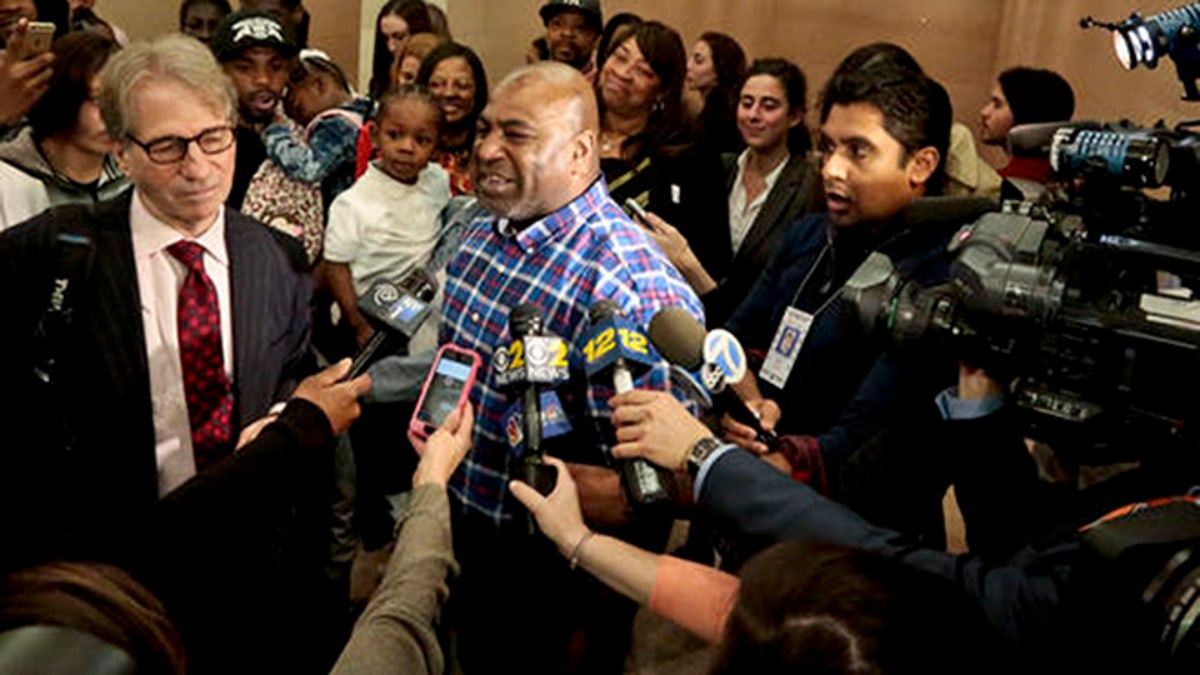
Andre Hatchett, center, stands next to his lawyer Barry Scheck as he holds a press conference after his exoneration in court Thursday March 10, 2016, in Brooklyn, N.Y. Hachett, serving 25 years to life in the killing of Neda Mae Carter, is the 19th wrongfully-convicted prisoner freed by the Brooklyn District Attorney Ken Thompson's Conviction Review Unit. (AP Photo/Bebeto Matthews) (Copyright 2016 The Associated Press. All rights reserved. This material may not be published, broadcast, rewritten or redistribu)
NEW YORK – The woman had been found dead, naked, beaten and dragged into a cross-like position in a park. And the suspect had an instant connection to the crime: He was a friend who left her apartment with her that night.
Andre Hatchett would soon be convicted of murder. But nearly a quarter century later, he was freed and the case against him thrown out Thursday after prosecutors and Hatchett's lawyers said they'd found the case was tainted with a dubious star witness, prosecutorial mistakes that denied Hatchett key information and defense lawyers who failed him at not one but two trials.
"Because I knew I didn't do it, I knew I was going to be home one day," an ebullient Hatchett, 49, said as he left court, pausing to hug relatives and hoist two grandchildren into his arms.
His 1991 case was among more than 100 often decades-old convictions that Brooklyn District Attorney Kenneth Thompson's office has been revisiting in one of the most ambitious reviews of its kind nationwide. So far, prosecutors have disavowed 19 convictions and are standing by 38 others.
Hatchett's case, Assistant District Attorney Mark Hale said, was one of "systemic failure."
Prosecutors' star witness originally named another man as the killer, yet police and prosecutors then credited the witness when he picked Hatchett from a lineup. Prosecutors never told Hatchett's lawyers the witness had initially pointed to someone else. The witness falsely denied on the stand that he'd smoked crack the day of the killing.
And the fact that Hatchett had injuries that raise doubts about his ability to carry out the crime went unmentioned at trial, even by his own attorneys. One was so inept that a judge declared a mistrial, and the next was hardly vigorous, giving only an 11-minute closing argument, Hale said.
And Hatchett could hardly help his defense: Because of lifelong intellectual disabilities, he was barely able to read or write at the time, his lawyers said.
Convicted at the second trial, Hatchett was serving 25 years to life in the February 1991 killing of Neda Mae Carter, who was strangled and beaten in the head. She was 38 and lived in a rooming house where Hatchett frequently visited his aunt, according to his lawyers.
After her killing, Hatchett cooperated with police and gave an alibi, according to his legal team, which includes the Innocence Project and defense lawyer James Brochin.
A week later, a suspect in an unrelated burglary, Gerald "Jerry" Williams, told police he and a friend had seen the killing in the park.
He identified a suspect, but that man turned out to have a powerful alibi: He was in jail.
Then police put Hatchett in a lineup, and Williams picked him out. So did Williams' friend, though she was unsure at first and was never called to testify, Hatchett's lawyers said.
Williams' switch in suspects cast his reliability into question, so prosecutors should have disclosed it, Hale said, attributing their failure to carelessness.
Meanwhile, Hatchett's jurors never heard that on the day of the killing, he was on crutches, having been shot in the legs and trachea months earlier. Prosecutors now agree those injuries would have made it nearly impossible for him to drag Carter's body and shout at the witnesses, as Williams described.
The assistant district attorney who tried the case is no longer a prosecutor and didn't immediately return a message Thursday. The judge and Hatchett's trial defense lawyer have died. Contact information for Williams couldn't immediately be found.
Hatchett was denied parole in November, with a parole board noting disciplinary write-ups that included fighting and defying orders, according to state prison system records.
On Thursday, Hatchett restarted his life with a celebratory barbecue lunch with his family though also with thoughts of the mother, brother, son and other loved ones who died while he was in prison.
"I just kept holding on, holding on," he said. "And now I'm going to get back up."









































